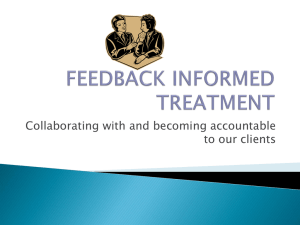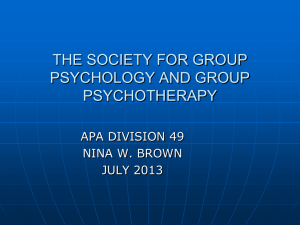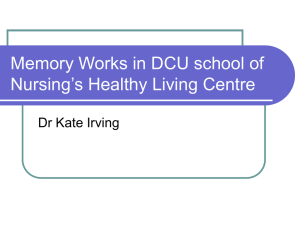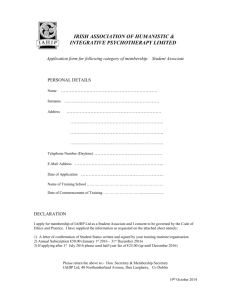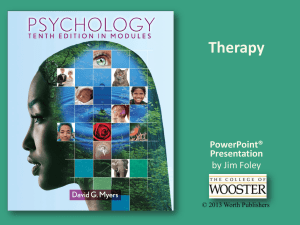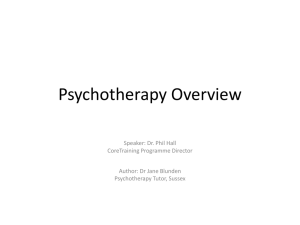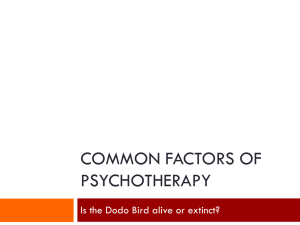click for more information
advertisement
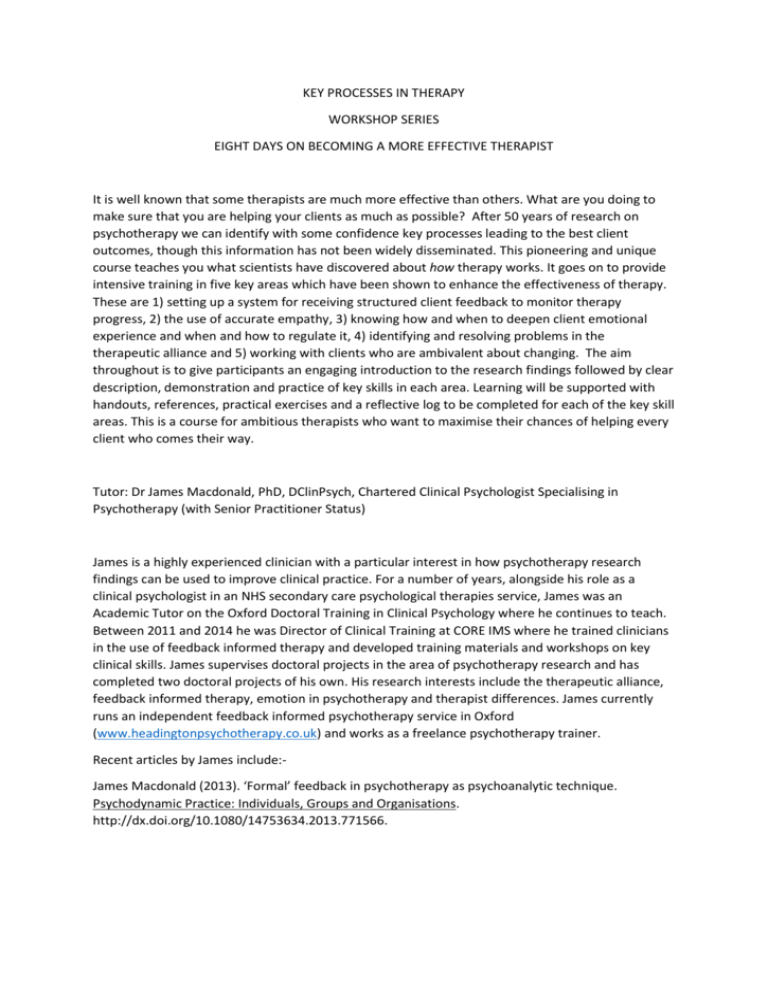
KEY PROCESSES IN THERAPY WORKSHOP SERIES EIGHT DAYS ON BECOMING A MORE EFFECTIVE THERAPIST It is well known that some therapists are much more effective than others. What are you doing to make sure that you are helping your clients as much as possible? After 50 years of research on psychotherapy we can identify with some confidence key processes leading to the best client outcomes, though this information has not been widely disseminated. This pioneering and unique course teaches you what scientists have discovered about how therapy works. It goes on to provide intensive training in five key areas which have been shown to enhance the effectiveness of therapy. These are 1) setting up a system for receiving structured client feedback to monitor therapy progress, 2) the use of accurate empathy, 3) knowing how and when to deepen client emotional experience and when and how to regulate it, 4) identifying and resolving problems in the therapeutic alliance and 5) working with clients who are ambivalent about changing. The aim throughout is to give participants an engaging introduction to the research findings followed by clear description, demonstration and practice of key skills in each area. Learning will be supported with handouts, references, practical exercises and a reflective log to be completed for each of the key skill areas. This is a course for ambitious therapists who want to maximise their chances of helping every client who comes their way. Tutor: Dr James Macdonald, PhD, DClinPsych, Chartered Clinical Psychologist Specialising in Psychotherapy (with Senior Practitioner Status) James is a highly experienced clinician with a particular interest in how psychotherapy research findings can be used to improve clinical practice. For a number of years, alongside his role as a clinical psychologist in an NHS secondary care psychological therapies service, James was an Academic Tutor on the Oxford Doctoral Training in Clinical Psychology where he continues to teach. Between 2011 and 2014 he was Director of Clinical Training at CORE IMS where he trained clinicians in the use of feedback informed therapy and developed training materials and workshops on key clinical skills. James supervises doctoral projects in the area of psychotherapy research and has completed two doctoral projects of his own. His research interests include the therapeutic alliance, feedback informed therapy, emotion in psychotherapy and therapist differences. James currently runs an independent feedback informed psychotherapy service in Oxford (www.headingtonpsychotherapy.co.uk) and works as a freelance psychotherapy trainer. Recent articles by James include:James Macdonald (2013). ‘Formal’ feedback in psychotherapy as psychoanalytic technique. Psychodynamic Practice: Individuals, Groups and Organisations. http://dx.doi.org/10.1080/14753634.2013.771566. James Macdonald & John Mellor-Clark (2014). Correcting Psychotherapists’ Blindsidedness: Formal Feedback as a Means of Overcoming the Natural Limitations of Psychotherapists. Clinical Psychology and Psychotherapy DOI: 10.1002/cpp.1887. Aafjes-van Doorn, K., Macdonald, J., Stein, M., Cooper, A., &Tucker, S. (2014). Experiential Dynamic Therapy: A Preliminary Investigation into the Effectiveness and Process of the Initial Extended Session. Journal of Clinical Psychology DOI: 10.1002/jclp.22094 Llewelyn, S., Macdonald, J. & Aafjes-van Doorn (in press). Process-Outcome Studies. In J. Norcross, G. VandenBos & D. Freedheim (eds.) APA Handbook of Clinical Psychology: Volume II. Clinical Psychology: Theory and Research. For more information about James and downloads of some of his writing see www.headingtonpsychotherapy.co.uk Cost: £980 TIMETABLE Date Day Title 17/04/15 20/05/15 21/05/15 19/06/15 09/07/15 10/09/15 15/10/15 16/10/15 Fri Wed Thurs Fri Thurs Thurs Thurs Fri Psychotherapy Research for psychological therapists Key Processes in Therapy: Feedback (1) Key Processes in Therapy: Feedback (2) Key Processes in Therapy: Empathy Key Processes in Therapy: Working with Emotion Key Processes in Therapy: Working with Ambivalence Key Processes in Therapy: Resolving Ruptures in the Therapeutic Relationship Putting it all together: systematically improving our effectiveness Day One: Psychotherapy Research for Psychological Therapists Morning The beginnings of psychotherapy research Establishing that therapy is an effective treatment: an introduction to Randomised Controlled Trials (RCTs) and related controversies The greatest psychotherapy RCT: The NIMH Treatment of Depression Collaborative Research Programme The ‘Dodo Bird’ controversy Summarising RCTs: Meta-analyses and evidence based treatments. The effectiveness of psychotherapy: glass half full or glass half empty? Afternoon Introduction to process-outcome research. How does psychotherapy work? Techniques and outcomes Therapists and outcomes The therapeutic alliance and outcomes The client and outcomes The challenge of making sense and making use of psychotherapy research Day will include quizzes, discussion and small group exercises to contextualise learning. Day Two: Key Processes in Therapy: Feedback (1) Morning Recap from Day One on outcomes in psychotherapy. Introduction to practice based evidence. Case studies in the use of outcomes in routine practice to improve effectiveness in medicine Recap from Day One on processes linked to outcome in psychotherapy Introduction to systematic use of process monitoring in medicine and elsewhere to improve outcomes Afternoon Introduction to Mike Lambert’s research on feedback in psychotherapy Feedback and Clinical Support Tools The evidence base for feedback The limits of expertise in psychotherapy Putting it together: Feedback and process-outcome findings in psychotherapy. Day will include quizzes, discussion and small group exercises to contextualise learning. Day Three: Key Processes in Therapy: Feedback (2) Morning Setting the interpersonal scene for the effective use of feedback A feedback experiment Feedback tools: finding the right vehicle (from Rolls Royce to Ford Fiesta) Introducing feedback to clients Video example Afternoon Frequent barriers to progress in therapy Evidence based clinical skills linked to common problems in therapy ‘Failing successfully’ in therapy Using an alliance measure as feedback Getting started with feedback and making it work in your clinical setting Day will include quizzes, discussion and small group exercises to contextualise learning. Day Four: Key Processes in Therapy: Empathy Morning Definitions of empathy Contemporary perspectives on empathy Evidence on the relationship between therapist empathy and client outcomes in psychotherapy A closer look at empathy in psychotherapy with video examples Can empathy be learned? Afternoon Strengthening the empathy muscles: Exercises for building our empathic capacity Empathy and the practice of mindfulness in therapists’ development Discussion of reflective diary practice on the development of empathy in your clinical work Day will include quizzes, discussion and small group exercises to contextualise learning. Day Five: Key Processes in Therapy: Working with Emotion Morning What is an emotion? The relevance of emotion to psychotherapy An interpersonal emotion focused model of the development and alleviation of psychopathology A simple integrative psychodynamic model for formulating emotional conflicts Video exercise on formulating emotional conflict in here and now psychotherapy process Afternoon Techniques for helping clients access underlying emotion in psychotherapy Video exercise from Emotion Focused Therapy Role play exercises on supporting client emotional awareness and expression Techniques for helping clients regulate overwhelming emotion Role play exercises on helping clients regulate overwhelming emotion Discussion of reflective diary practice on the development of skills in working with emotion. Day will include quizzes, discussion and small group exercises to contextualise learning. Day Six: Key Processes in Therapy: Working with Ambivalence Morning Client engagement as the key to change in therapy What is resistance? Recognising client resistance and ambivalence Ambivalence in language – change talk and sustain talk To be or not to be expert Video exercise Afternoon Motivating relationships: insights from theory and research Using empathic reflection to evoke clients’ motivation – video analysis Using empathic reflection with ambivalent clients – skills practice Providing useful information without triggering resistance Research on motivational work in psychological therapy. Discussion of reflective diary practice on the development of skills in working with client ambivalence and motivation Day will include quizzes, discussion and small group exercises to contextualise learning. Day Seven: Key Processes in Therapy: Resolving Ruptures in the Therapeutic Relationship Morning Reminder of key findings regarding the therapeutic relationship and outcome Definitions of therapeutic relationship and ruptures Persecutory therapy and the move towards relational thinking Codes for trouble: recognising and formulating relational difficulties in therapy Rupture types Video exercise Afternoon Video exercise Typology of rupture repair approaches and principles of rupture repair Metacommunication Video exercise Role Play exercises Feedback and rupture repair Discussion of reflective diary practice on the development of skills in rupture repair Day will include quizzes, discussion and small group exercises to contextualise learning. Day Eight: Putting it all together: systematically improving our effectiveness The focus of this final day will be to consolidate learning over the course. The day will consist of small group and whole group discussion, sharing of extracts from reflective diaries, and thinking through next steps in learning to become more effective therapists. If you would like more information on the key clinical skills course please contact James at james@oxfordpsychologicaltraining.co.uk . James will be very happy to answer any questions and arrange a call with you if you are thinking of signing up for the course.
